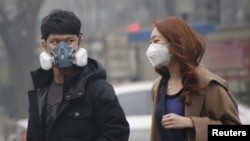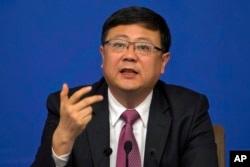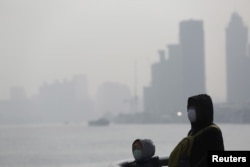In a rare admission, China’s environmental minister has said several local and provincial government agencies are not doing enough to implement environmental regulations, and in some cases even protecting heavily polluting industries.
The comments by Chen Jining, at a press conference on the sidelines of ongoing high-level political meetings in Beijing Friday, were a warning to local governments that intensifying efforts in China to crack down on polluters would extend to officials who neglect their duties.
"It is a signal to decision-makers at the local and provincial levels that the central government is very concerned about implementing the environment protection law and that they will be held accountable," said Changhua Wu, Greater China director of The Climate Group.
Local resistance
Decades of breakneck economic growth in China have helped millions lift themselves out of poverty, but it has also come at a high cost to the environment. And now as the economy enters its slowest growth rate in a quarter of a century, officials are looking for ways to address the hazardous by-products of that growth model: notoriously choking smog, polluted rivers and tainted soil.
And while it is widely recognized that the failure of local governments in enforcing laws and regulations is, to a large extent, responsible for pollution and environmental degradation, there is still much work to be done.
In his comments, the minister cited specific instances about how grassroots protection agencies were left powerless and without support by local governments. In one case, he mentioned, a local court refused to accept a case filed against a heavily polluting industry until the judicial authorities in Beijing intervened.
Price to pay for polluters
Chen said owners of polluting industries will be charged with criminal offenses for causing grievous harm to those who have suffered due to contaminated air and water. The process has already begun, he added, and as many as 2,000 cases nationwide have been filed against polluters with the public security bureau.
The government also is considering imposing an environmental protection tax on polluters. This would be on top of government orders for polluting industries to pay compensation to pollution victims.
The minister said a large number of heavily polluting industries would be closed down if they failed to comply with the law. Heavily polluting industries, which burn coal, will be encouraged to upgrade their technologies to lower the rate of carbon emissions or phased out, he said.
Even NASA agrees
At the same time, Chen praised efforts made by the central government to cut down air pollution since the environment protection law came into force one year back. There has been a significant reduction in 74 cities in the average concentration of PM 2.5, tiny particles in the air that are absorbed by the lungs and blamed as a cause of heart and lung disease.
"Our efforts have resulted in an obvious trend of improvement in air quality. Relevant satellite of NASA [have] also observed that there was a reduction of particles in China's eastern and middle regions last year," the minister said.
However, he acknowledged that several Chinese cities saw heavy smog over three weeks in November and December, while the situation improved in the first two months of 2016.
"We have solved the problems earlier and better than developed countries," he said.
On social media, not all were convinced. Some noted that the only reason why the air quality was improving was because factories are making fewer products and so require less energy. Some doubted China could break its overreliance on coal – a key source of the country’s pollution.
Others argued that recent strong winds had played a bigger role than government actions in clearing the air.
Anti-pollution protests
In recent years, China has seen a growing number of protests by people living in the vicinity of industries suspected of contaminating air or drinking water supplies.
Changhua Wu said the agitations are driving the government to act fast and effectively.
Major solutions include "clearly defined legal and administrative liability of local officials and a well-governments enforcements mechanism," she said. Those must be "supported by information disclosure and transparency, as well as a much sharper eye of the society and the watchdogs to make sure that there is zero tolerance of noncompliance."






